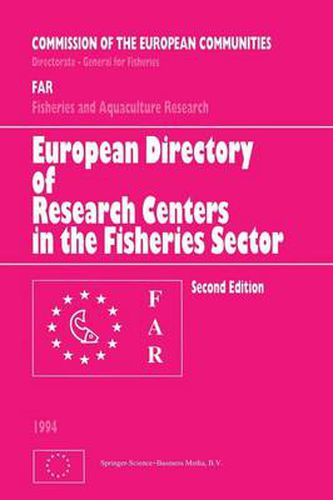Readings Newsletter
Become a Readings Member to make your shopping experience even easier.
Sign in or sign up for free!
You’re not far away from qualifying for FREE standard shipping within Australia
You’ve qualified for FREE standard shipping within Australia
The cart is loading…






This title is printed to order. This book may have been self-published. If so, we cannot guarantee the quality of the content. In the main most books will have gone through the editing process however some may not. We therefore suggest that you be aware of this before ordering this book. If in doubt check either the author or publisher’s details as we are unable to accept any returns unless they are faulty. Please contact us if you have any questions.
The future of the Common Fisheries Policy depends on progress in the relevant areas of research. This applies to the whole range of management decisions, where precise, reliable and complete data are essential to inform those who must decide on the pursuit of existing activities, especially in the area of maritime fisheries, and the development of promising new activities such as aquaculture. Every day the Director-General of DG XIV requires more and more information to prepare decisions which will affect the future of all those in the Community who are dependent on fishing and aquaculture. There is thus a high level of direct demand from DG XIV. Over and above this immediate and specific requirement for short- and medium-term applications, research affects the competitivity of the Community. This is one area which favours the collaboration across frontiers of all those who seek to advance knowledge. But although DG XIV is uniquely placed to appreciate the importance of research into fisheries and aquaculture, there is no question of succumbing to the temptation to directly control the scope of research or its conduct. The notion of subsidiarity can best be understood by examining the existing structures in the Member States. The Commission must act first and foremost as a catalyst, by promoting the circulation of information and the coordination of research programmes.
$9.00 standard shipping within Australia
FREE standard shipping within Australia for orders over $100.00
Express & International shipping calculated at checkout
This title is printed to order. This book may have been self-published. If so, we cannot guarantee the quality of the content. In the main most books will have gone through the editing process however some may not. We therefore suggest that you be aware of this before ordering this book. If in doubt check either the author or publisher’s details as we are unable to accept any returns unless they are faulty. Please contact us if you have any questions.
The future of the Common Fisheries Policy depends on progress in the relevant areas of research. This applies to the whole range of management decisions, where precise, reliable and complete data are essential to inform those who must decide on the pursuit of existing activities, especially in the area of maritime fisheries, and the development of promising new activities such as aquaculture. Every day the Director-General of DG XIV requires more and more information to prepare decisions which will affect the future of all those in the Community who are dependent on fishing and aquaculture. There is thus a high level of direct demand from DG XIV. Over and above this immediate and specific requirement for short- and medium-term applications, research affects the competitivity of the Community. This is one area which favours the collaboration across frontiers of all those who seek to advance knowledge. But although DG XIV is uniquely placed to appreciate the importance of research into fisheries and aquaculture, there is no question of succumbing to the temptation to directly control the scope of research or its conduct. The notion of subsidiarity can best be understood by examining the existing structures in the Member States. The Commission must act first and foremost as a catalyst, by promoting the circulation of information and the coordination of research programmes.